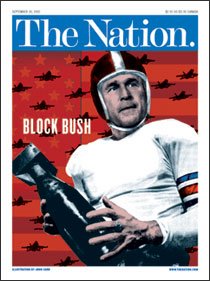Taste of "The Nation"

The Nation is an excellent source of political and social news. Check out some to the lastest postings here and then subscribe~
November 2, 2005 (November 21, 2005 issue)
All the King's Media
William Greider
Amid the smoke and stench of burning careers, Washington feels a bit like the last days of the ancien régime. As the world's finest democracy, we do not do guillotines. But there are other less bloody rituals of humiliation, designed to reassure the populace that order is restored, the Republic cleansed. Let the perp walks begin. Whether the public feels reassured is another matter.
George W. Bush's plight leads me to thoughts of Louis XV and his royal court in the eighteenth century. Politics may not have changed as much as modern pretensions assume. Like Bush, the French king was quite popular until he was scorned, stubbornly self-certain in his exercise of power yet strangely submissive to manipulation by his courtiers. Like Louis Quinze, our American magistrate (whose own position was secured through court intrigues, not elections) has lost the "royal touch." Certain influential cliques openly jeer the leader they not so long ago extolled; others gossip about royal tantrums and other symptoms of lost direction. The accusations stalking his important counselors and assembly leaders might even send some of them to jail. These political upsets might matter less if the government were not so inept at fulfilling its routine obligations, like storm relief. The king's sorry war drags on without resolution, with people still arguing over why exactly he started it. The staff of life--oil, not bread--has become punishingly expensive. The government is broke, borrowing formidable sums from rival nations. The king pretends nothing has changed.
The burnt odor in Washington is from the disintegrating authority of the governing classes. The public's darkest suspicions seem confirmed. Flagrant money corruption, deceitful communication of public plans and purposes, shocking incompetence--take your pick, all are involved. None are new to American politics, but they are potently fused in the present circumstances. A recent survey in Wisconsin found that only 6 percent of citizens believe their elected representatives serve the public interest. If they think that of state and local officials, what must they think of Washington?
For more of this article, link to:http://www.thenation.com/doc/20051121/greider
"Is Wal-Mart going wobbly?" Peter Rothberg~The Nation, Blogger
In his Washington Post column yesterday, Harold Meyerson tried to make sense of some unexpected recent moves by America's largest and most reviled company.
First, Wal-Mart announced plans to soon start offering more affordable health insurance to its employees. Then the company pledged to shift to more environmentally responsible policies and to start monitoring the health and safety practices of its foreign suppliers. Finally, advocates of raising the minimum-wage--stagnant since 1997--received a powerful and unexpected new ally in Wal-Mart CEO Lee Scott, who called on Congress to act now to raise wages nationwide.
It seems to me that these initiatives ought to be applauded. Wal-Mart is feeling the heat and reacting accordingly. (The company's share price is down 13 percent.) And this is largely a result of determined organizing dedicated to detailing Wal-Mart's role as the linchpin of the low-wage, no-benefit economy. Activist groups like Wake-Up Wal-Mart and Wal-Mart Watch should take a bow.
Also at play, as Meyerson points out, is Scott's correct assessment of his own self-interest. "Wal-Mart is bumping up against a serious problem at least partly of its own making: Because it pitches its products to a disproportionately low-income clientele, its revenue rises and falls with the fortunes of the lower end of the American working class."
So when the working class is getting royally screwed, Wal-Mart will eventually feel the pain too. (Scott could, of course, raise his own workers' wages, but he dismissed that out-of-hand, saying that he's operating "in a very competitive business climate.")
So the goal for activists now is to keep up the pressure. Scott is smartly showing that he's not immune to public pressure. And that pressure is about to get worse as award-winning filmmaker Robert Greenwald's new documentary, The High Cost of Low Price, on Wal-Mart is now out and available. The film is a powerful, emotional and entertaining way to help trigger change in the way America's largest company conducts business in the US and across the globe. It has the potential to raise much more awareness about what's wrong with Wal-Mart and why--which is the reason that The Nation is part of a national network supporting and promoting the release of the documentary. (It's also a really good movie!)
This film will educate, inspire and motivate viewers and with your assistance, it will be an important part of the campaign to make Wal-Mart a better company. Here's how you can help:
Pre-order the DVD.
Sign up today to host a screening.
RSVP to attend a screening in your neighborhood.
Download and distribute promo material about the film.
Watch and circulate the film's trailer.
posted November 2, 2005 (November 21, 2005 issue)
Can We Talk?
Eric Alterman
Conservatives may look to be imploding at the moment, but liberals have a serious long-term problem that won't go away. Despite an almost perfectly evenly divided electorate, virtually the entire government and most of the opinion media are controlled by extremist right-wing reactionaries. Their advantages, moreover, can only grow as a stacked system of representation favoring rural areas and red-state strongholds, coupled with a traditional but increasing advantage in fundraising, offer the ruling right wing further opportunities to cement their gains and pursue new ones.
To New Democrat academics (and former Clinton Administration officials) Elaine Kamarck and William Galston, authors of the study The Politics of Polarization, the answer is for Democrats to jettison their liberal base and embrace a series of conservative and centrist policy proposals. To New Republic editor Peter Beinart, it is to expunge everyone and everything associated with the 3 million-member MoveOn.org, which coincidentally happens to be the most effective organizing and fundraising tool liberals have come up with in the past two decades. Both solutions are not merely misguided but counterproductive. (Beinart's, moreover, is altogether impossible. Just how would liberals expunge MoveOn members? Loyalty oaths? Lie detector tests? What candidate is going to refuse their support? And is this really a moment when so-called "liberal hawks" ought to be lecturing those of us who were right about George Bush's catastrophic war?)
Kamarck and Galston's argument, on the other hand, seems to rest heavily on a simple misunderstanding. Just because voters refused to call themselves "liberal" doesn't mean they reject liberal policy solutions. As I pointed out in my last column, in fact the opposite is true. Kamarck and Galston counsel surrender on exactly the ground where liberals are strongest: public policy arguments where modern--admittedly chastened--liberals share a broad agreement with the majority of Americans on matters of health policy, taxation, environmental protection, regulation, freedom of choice and even most foreign policy issues. No less significant, American voters often care more about whether a given candidate truly believes what he or she says than about whatever this or that policy detail might be. Caving in to conservatives across the board would appear to confirm Robert Frost's devastating quip: A "liberal" is someone so broadminded he won't take his own side in an argument.
For more of this article, link to:http://www.thenation.com/doc/20051121/alterman


0 Comments:
Post a Comment
<< Home